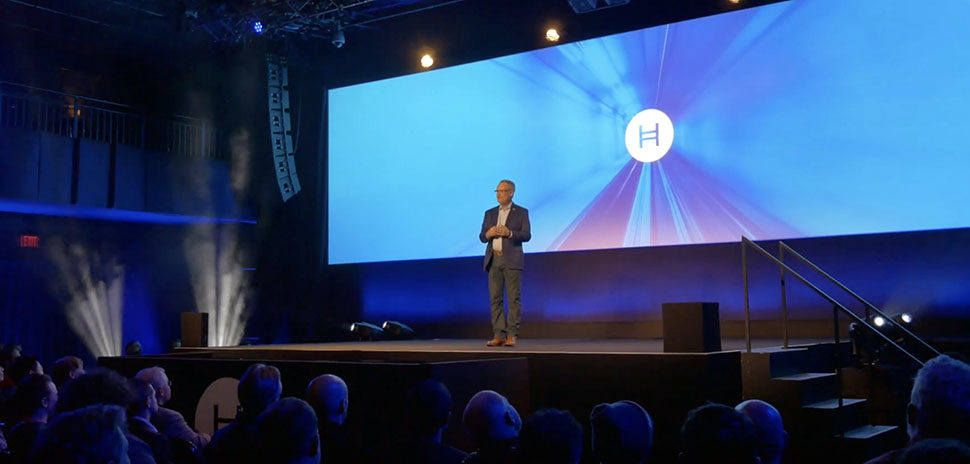Dallas-based distributed ledger platform Hedera Hashgraph has put out the virtual welcome mat, opening its main network to the public and giving anyone the ability to create accounts or build decentralized applications (dapps) on its network.
The company touts its platform as providing faster transactions and greater capacity to scale, making it better for enterprise and commerce. Hundreds of developers already were building on Hedera’s network in the closed beta, and the main network Open Access beta launched with 26 dapps (a decentralized application) and solutions running live.

Mance Harmon [Photo: Rebecca Posadas-Nava]
Dallas Innovates first mentioned the Hedera main network—called Mainnet—earlier this year when the company announced that IBM and Tata Communications were joining Hedera’s governing council, a big-name group of backers.
“Today we are thrilled that, through open access, dozens of decentralized applications are now live and running on the mainnet, along with mirror nodes and other parts of the ecosystem designed to expand Hedera’s reach and adoption,” Mance Harmon, co-founder and CEO of Hedera Hashgraph, said Tuesday in a statement.
Now that the network is live, Hedera said it would begin distributing more than 379 million of its native cryptocurrency HBAR coins to investors who participated in a $124 million offering earlier this year.
Hedera also earlier open-sourced its mirror node code, allowing anyone who wants to run a mirror node to do so. Mirror nodes offer access to all consensus decisions and the state of the ledger.
Dapps link the Hashgraph network to the public
In order for distributed ledger technology to become mainstream, it has to be easy to integrate. That’s why Hedera is working with hundreds of developers to link to private networks. Over two dozen of them are running dapps that were integrated into the mainnet prior to the public launch, Harmon told CoinDesk.
Among the 26 developers are two from North Texas: Zabo and Hashing Systems.
“As cryptocurrency and distributed ledger projects grow and gain adoption, we are working hard to make Zabo the go-to developer API for easily integrating cryptocurrency wallets into applications,” Zabo founder and President Alex Treece said in a statement.
READ NEXT Have a Case of Cryptoconfusion? Demystify With Zabo’s Newly Launched Risk-Free Simulation
Zabo, a technology platform that enables applications to connect users’ cryptocurrency wallets and blockchain accounts, said it is launching a connector for Hedera Hashgraph accounts and supporting HBAR coins. That will allow any developer to easily connect Hedera accounts with their application in just a few lines of code.
Hashing Systems’ tools allow for rapid development of decentralized apps. Hashing Systems CEO Pablo Peillard said he is excited to see an increase in enthusiasm for decentralized domains.
“These domains provide users with critical advantages: the ability to engage in crypto like one does in the web today, through simple human readable names, and a platform for creating true web 3.0 websites,” Peillard said.
Hedera noted that other dapps now live on its platform include AdsDax, a decentralized advertising platform and marketplace that already has conducted over 2 million transactions in 10 days on the Hedera network during live customer campaigns; Certara, a global, model-informed drug development and decision support leader running a mirror node to provide insight on transactions on the Hedera network; and Chainlink, which will provide Hedera-based applications with reliable oracles and connectivity to off-chain data.
Hedera said that with Open Access, its networks offer three services: cryptocurrency (throttled to 10,000 transactions per second), and smart contracts and file services (each throttled to 10 transactions per second). Hedera plans to increase its speeds methodically throughout the year as part of a strategy to roll out network services in a measured and responsible way.
In terms of speed and scalability, Eric Wall, former blockchain at fintech vendor Cinnober (owned by Nasdaq), told Coindesk that the speed only applies to certain types of transactions.
“A dapp requires smart contracts and since Hedera is currently throttling 10 transactions per second with smart contracts, then it doesn’t make this any more interesting than ethereum,” said Wall, who wrote a pair of skeptical Medium posts about Hedera, according to Coindesk. Ethereum is a public, open-source, blockchain-based distributed computing platform and operating system that features smart contract functionality.
The Hedera Governing Council, composed of 39 term-limited members, governs any changes to the software run by the Hedera distributed nodes, and brings stability and decentralization to the company’s public ledger, the company said.
The company’s recently announced Hedera Consensus Service will be available to the public later this year, which is expected to deliver similar performance and speed to Hedera’s cryptocurrency service.
![]()
Get on the list.
Dallas Innovates, every day.
Sign up to keep your eye on what’s new and next in Dallas-Fort Worth, every day.































